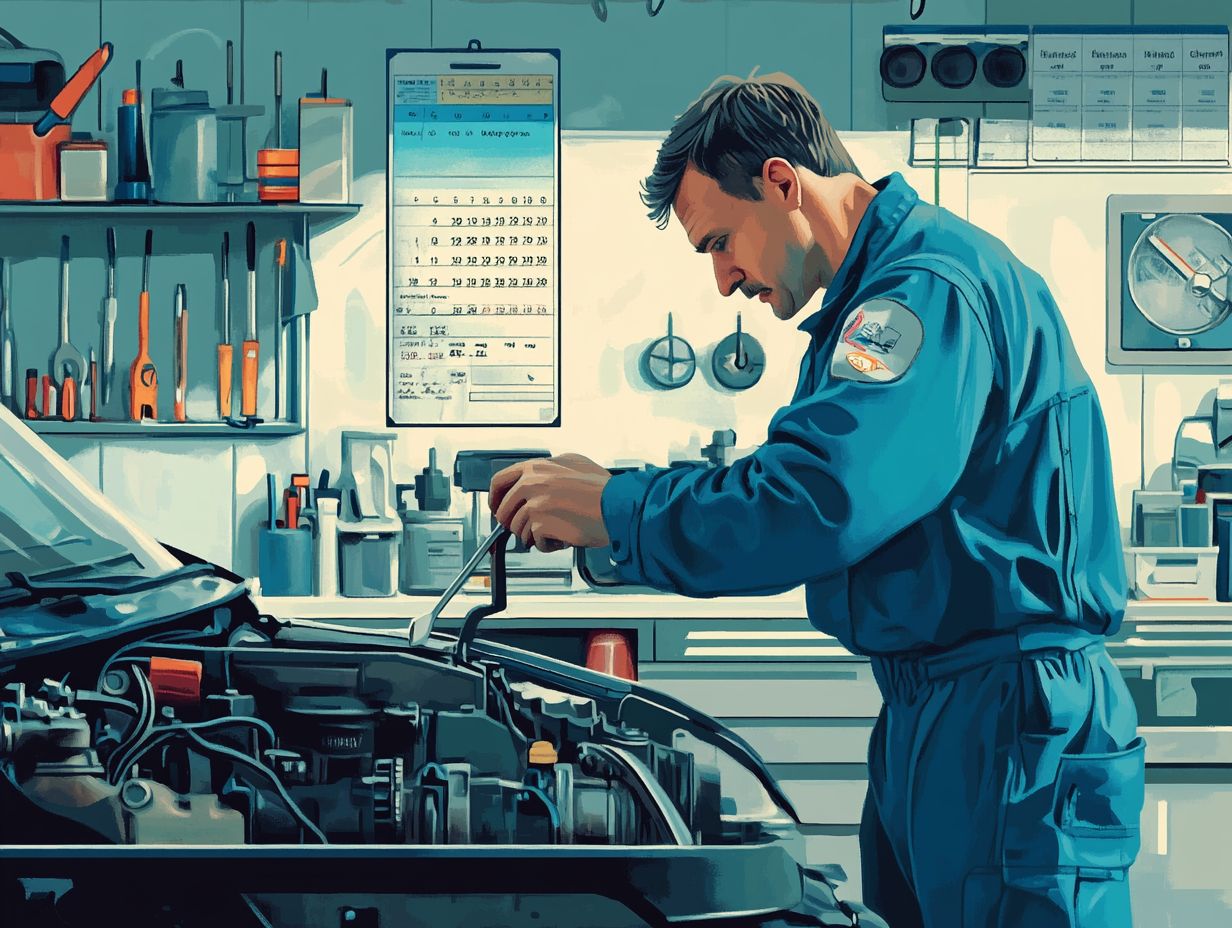Understanding Oil Change Intervals
Regular oil changes are essential for preserving your vehicle’s health! Don t wait to get your oil changed!
This article delves into oil change intervals, clarifying their meaning and importance. You’ll also learn the various factors that can influence them.
From your driving habits to the age of your vehicle, you’ll discover how to pinpoint the ideal schedule for your car.
Explore the many benefits of sticking to these intervals. Ignoring them can lead to serious repercussions.
Keep your engine running smoothly!
Contents
Key Takeaways:

- Regular oil changes keep your vehicle’s engine healthy!
- Your driving habits can change how often you need an oil change!
- Stick to your oil change schedule to save money on repairs!
What is an Oil Change Interval?
An oil change interval is the specific time or mileage recommended by manufacturers for replacing the engine oil in your vehicle. This ensures optimal maintenance and longevity.
Following the correct oil change intervals is vital for maintaining engine health and enhancing overall car performance and fuel efficiency. This recommendation considers your driving conditions, vehicle age, and the type of oil you choose be it conventional, synthetic, or high-mileage blends.
Ignoring these intervals can result in oil break down, which adversely affects engine protection. This may lead to costly repairs.
Factors that Affect Oil Change Intervals
Several factors play a crucial role in determining the oil change intervals for your vehicle. These factors directly impact both its performance and longevity.
Driving conditions such as frequent stop-and-go traffic, extreme temperatures, and aggressive driving can accelerate oil break down. This necessitates more frequent oil changes to preserve the integrity of the engine oil.
The age of your vehicle also affects how often you change your oil. Your adherence to manufacturer recommendations is also key.
Regular oil analysis and monitoring help you understand oil consumption trends and ensure optimal oil protection for your engine s components.
Driving Habits
Your driving habits significantly influence how often you need to change your oil. This is essential for maintaining optimal engine health and fuel efficiency.
Aggressive driving, frequent short trips, or carrying heavy loads can increase engine wear. This means you will need more frequent oil changes to preserve the integrity of the engine oil.
Conversely, smooth and cautious driving can prolong the life of your engine oil. This allows you to extend the intervals between changes.
For example, driving at moderate speeds while avoiding rapid acceleration boosts fuel efficiency and minimizes heat within the engine. Less heat can help maintain oil quality for longer.
If your vehicle primarily cruises on long highway journeys, it experiences less strain compared to one that endures stop-and-go traffic. Grasping these nuances enables you to adopt better maintenance routines.
By doing so, you ensure your engine remains healthy, while optimizing both performance and longevity.
Don t wait until it’s too late change your oil regularly! Check your oil change schedule and consult a professional if you’re unsure.
Vehicle Type and Age
The type and age of your vehicle play a crucial role in determining the ideal oil change intervals. These factors directly impact both performance and longevity.
If you drive a newer model, you may enjoy longer intervals due to advanced engineering and the use of synthetic oils.
On the other hand, if you re behind the wheel of an older vehicle, high-mileage blends may be your best friend. These oils are specifically formulated to address engine wear and oil consumption.
High-mileage oils contain additives that seal small leaks and restore lost engine performance. They are especially valuable for aging vehicles. The engine’s design and materials also influence how often you should change the oil.
A sporty car, for example, may require more frequent maintenance to meet its performance needs, even if it s relatively new.
Conversely, classic vehicles often need a more traditional oil approach to protect their vintage engines from deterioration. This highlights the importance of a tailored maintenance strategy that considers your vehicle’s unique characteristics.
How to Determine the Right Oil Change Interval for Your Vehicle

Determining the ideal oil change interval requires consulting your owner’s manual and assessing your unique driving habits. Manufacturers provide recommendations based on extensive testing, considering factors like oil quality, engine type, and expected driving conditions.
By following these guidelines, you enhance both the longevity and performance of your vehicle.
Consulting Your Owner’s Manual
Your owner s manual is a treasure trove of information! It offers precise oil change intervals tailored to your vehicle’s make and model.
By following the manufacturer’s recommendations, you can optimize engine performance and protect against premature wear.
Sticking to these guidelines closely allows you to significantly enhance your vehicle’s longevity and reliability.
The suggested intervals consider various factors like driving conditions and engine type. Therefore, consult the manual regularly, especially before long journeys or during seasonal transitions.
This practice helps you schedule timely oil changes and fortifies your vehicle’s overall health. Regularly checking the manual ensures you stay updated on any manufacturer recommendations, allowing your car to operate smoothly and preserve its value over time.
Considering Your Driving Habits
When determining oil change intervals, it s crucial to consider your driving habits, as they greatly influence your vehicle’s health and the oil’s performance.
Factors like stop-and-go traffic, highway driving, and road conditions can necessitate adjustments to the recommended intervals.
If you often navigate congested urban streets, your engine might be working harder, leading to increased wear and faster degradation of oil quality.
Conversely, if your routine involves mostly highway driving, you may extend those intervals due to consistent engine temperature and lower RPMs.
Keeping an eye on oil performance helps you make informed decisions about oil changes and ensures your vehicle operates at peak efficiency.
Regularly checking your oil levels and noting changes in color or consistency can provide valuable insights, giving you the power to engage in proactive maintenance that enhances your vehicle’s longevity and reliability.
Benefits of Following the Recommended Oil Change Interval
Adhering to the recommended oil change intervals brings numerous benefits, especially for your engine’s performance and longevity.
Consistently changing your engine oil maintains optimal oil quality, prevents contaminants from damaging engine components, and enhances overall engine protection.
This not only extends the life of your vehicle but also improves fuel efficiency, allowing you to enjoy a smoother, more reliable driving experience.
Check your oil change intervals today to maintain your vehicle’s health!
Improved Engine Performance
Maintaining optimal oil change intervals is essential for elevating your engine performance. Fresh oil is key to enhancing keeping your engine parts moving smoothly and minimizing friction among engine components.
By incorporating quality oil additives, you can further amplify this effect. This ensures your engine runs smoothly and efficiently.
When you stay diligent about your oil change schedule, you not only extend the life of your engine but also sidestep potentially costly repairs in the future. Fresh, high-quality oil serves as a protective barrier against wear and tear.
The right oil additives work to clean engine parts, neutralize acids, and prevent sludge buildup. This leads to better fuel efficiency, smoother acceleration, and reduced harmful emissions. It s vital for you to prioritize these routine maintenance tasks.
By recognizing the critical role fresh oil and additives play in lubrication, you can significantly enhance your car s longevity and overall performance.
Extended Engine Life

Adhering to oil change intervals can significantly extend your engine’s life by maintaining optimal oil quality and preventing wear caused by contaminants. Clean oil effectively safeguards engine components, promoting better health and longevity.
By ensuring that the oil is regularly replaced, you can prevent the formation of sludge and degradation that might hinder performance. Over time, dirt, debris, and other impurities can accumulate, increasing friction and wear within the engine.
This essential maintenance practice not only enhances engine efficiency but also helps maintain fuel economy, as a well-lubricated engine operates more smoothly.
Regularly changing the oil allows you to catch potential issues before they escalate into costly repairs, supporting your vehicle’s overall durability and reliability.
Consequences of Ignoring Oil Change Intervals
Neglecting oil change intervals can have serious repercussions for your vehicle, such as potential engine damage and diminished performance.
As time passes, failing to change the oil leads to degradation, which undermines lubrication and accelerates wear on essential engine components. This neglect can ultimately result in costly repairs that could have easily been avoided with a little maintenance.
Potential Damage to Your Vehicle
Neglecting oil change intervals can lead to serious repercussions for your vehicle, particularly in terms of engine wear and oil consumption. Without clean oil, friction among engine parts increases, which can cause overheating and ultimately result in engine failure if not addressed promptly.
Over time, sludge accumulates and clogs essential components, reducing overall engine efficiency. This not only hampers performance but also accelerates the wear and tear on gaskets and seals, leading to oil leaks and other complications.
Consistently skipping oil changes can impede the engine’s ability to dissipate heat effectively, putting extra strain on the cooling system.
In the long run, these issues can create a domino effect, jeopardizing your vehicle’s longevity and reliability. Don t wait get your oil changed regularly to avoid costly repairs!
Cost of Repairs
The costs associated with repairs from neglecting oil change intervals can be staggering, particularly if it leads to engine failure. By committing to regular maintenance, including timely oil changes, you can prevent these exorbitant expenses and keep your engine running smoothly, free from harmful contaminants.
Overlooking the significance of changing your vehicle’s oil at the recommended intervals not only jeopardizes the health of your engine but also puts your financial stability at risk. Neglecting such fundamental upkeep can lead to sludge buildup, decreased fuel efficiency, and ultimately, costly repairs that could have easily been avoided.
Regular oil changes aren t just an expense; they re an investment in the longevity of your vehicle. By prioritizing this essential maintenance, you can enjoy enhanced performance and a significantly reduced risk of unexpected mechanical failures, transforming your overall driving experience into a smoother and far more economical journey.
Frequently Asked Questions
What are oil change intervals?

Oil change intervals are the recommended times to change your vehicle’s oil. This is usually based on mileage or how long it’s been since the last change.
Why are oil change intervals important?
Proper oil change intervals keep your engine healthy and extend its life. Fresh oil keeps everything running smoothly and efficiently.
How often should I change my oil?
The ideal oil change frequency varies by vehicle make, model, and your driving habits. Generally, aim to change your oil every 3,000 to 5,000 miles or every 3 to 6 months.
What factors can impact oil change intervals?
Extreme temperatures, heavy traffic, and towing can shorten the oil change interval. Always follow your vehicle manufacturer’s guidelines for the best results.
Can I go longer between oil changes if I use synthetic oil?
Synthetic oil can last longer, often 7,500 to 10,000 miles between changes. However, check your vehicle’s recommendations to ensure you re covered.
What happens if I don’t change my oil on time?
Don t wait too long to change your oil! Delaying can cause sludge to build up, damaging your engine and reducing its lifespan.





